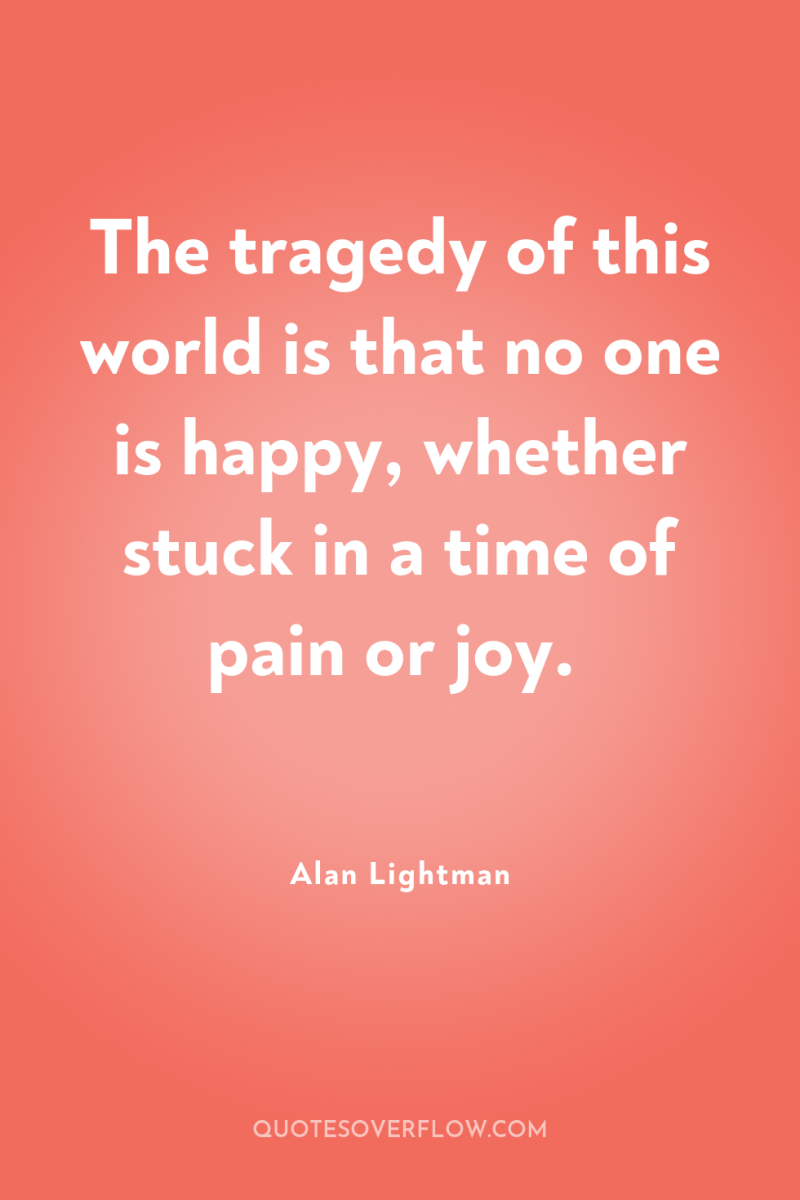
1
The tragedy of this world is that no one is happy, whether stuck in a time of pain or joy.Alan Lightman
2
Two men who had never seen each other before and would not likely see each other again. But their sincerity and sweetness, their sharing an instant in a fleeting life. It was almost as if a secret had passed between them. Was this some kind of love? I wanted to follow them, to touch them, to tell them of my happiness. I wanted to whisper to them: 'This is it. This is it'".Alan Lightman
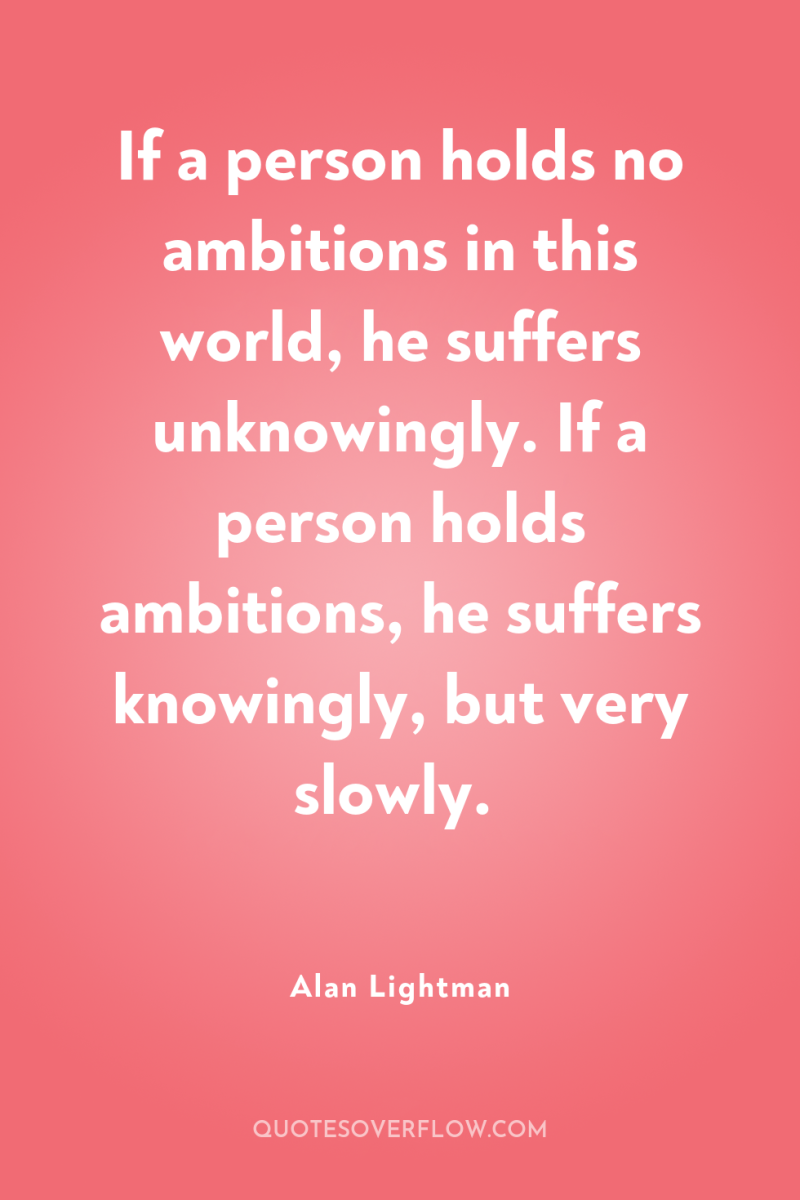
3
If a person holds no ambitions in this world, he suffers unknowingly. If a person holds ambitions, he suffers knowingly, but very slowly.Alan Lightman
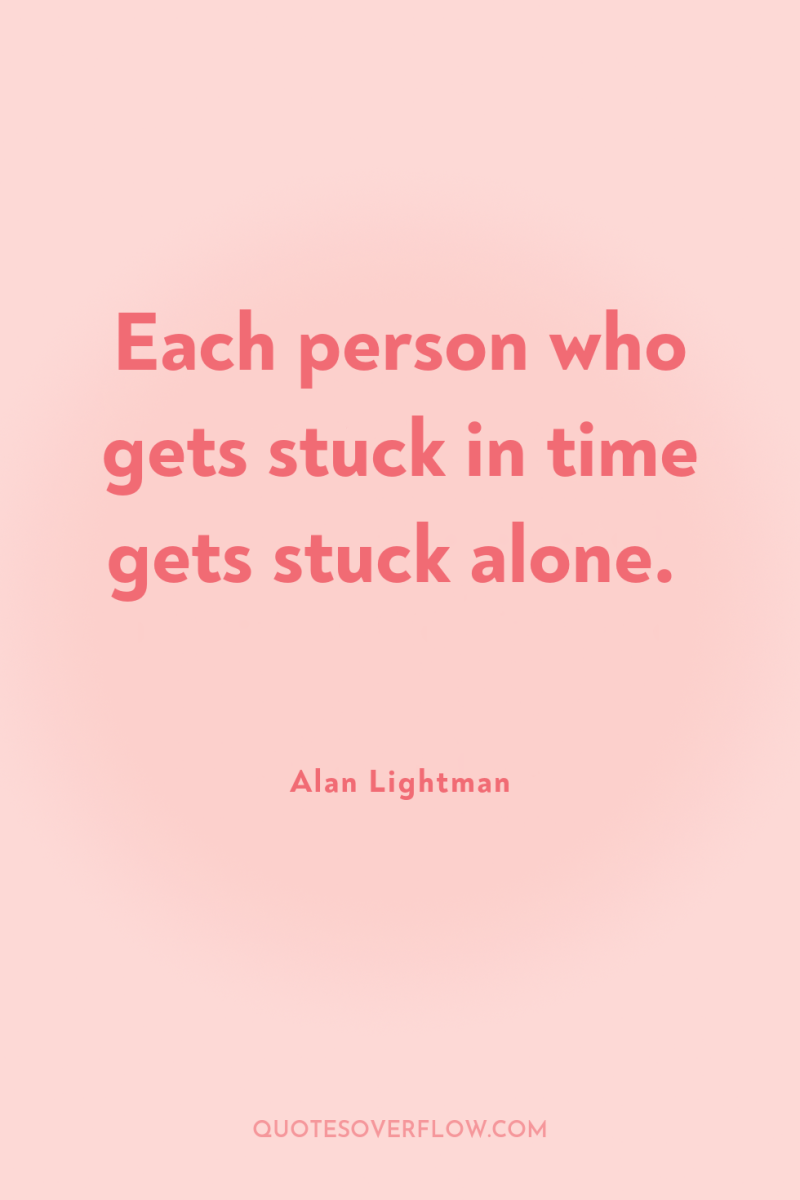
4
Each person who gets stuck in time gets stuck alone.Alan Lightman
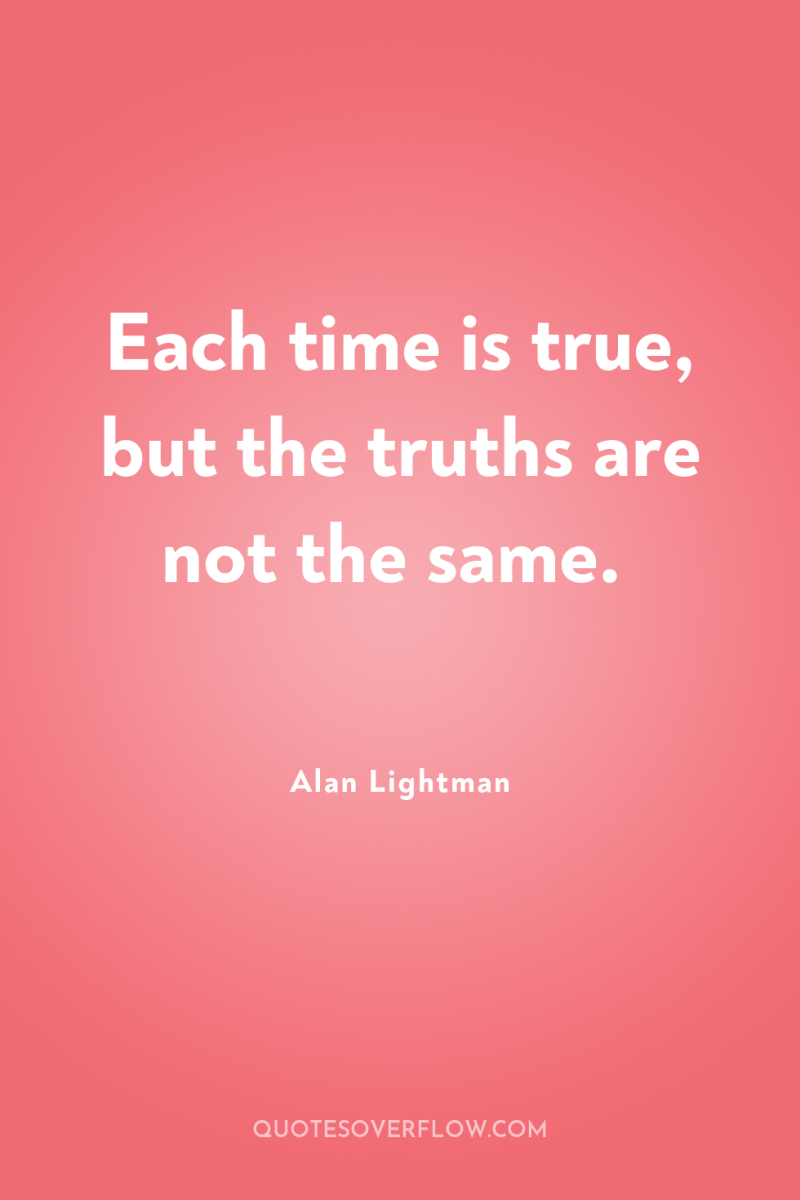
5
Each time is true, but the truths are not the same.Alan Lightman
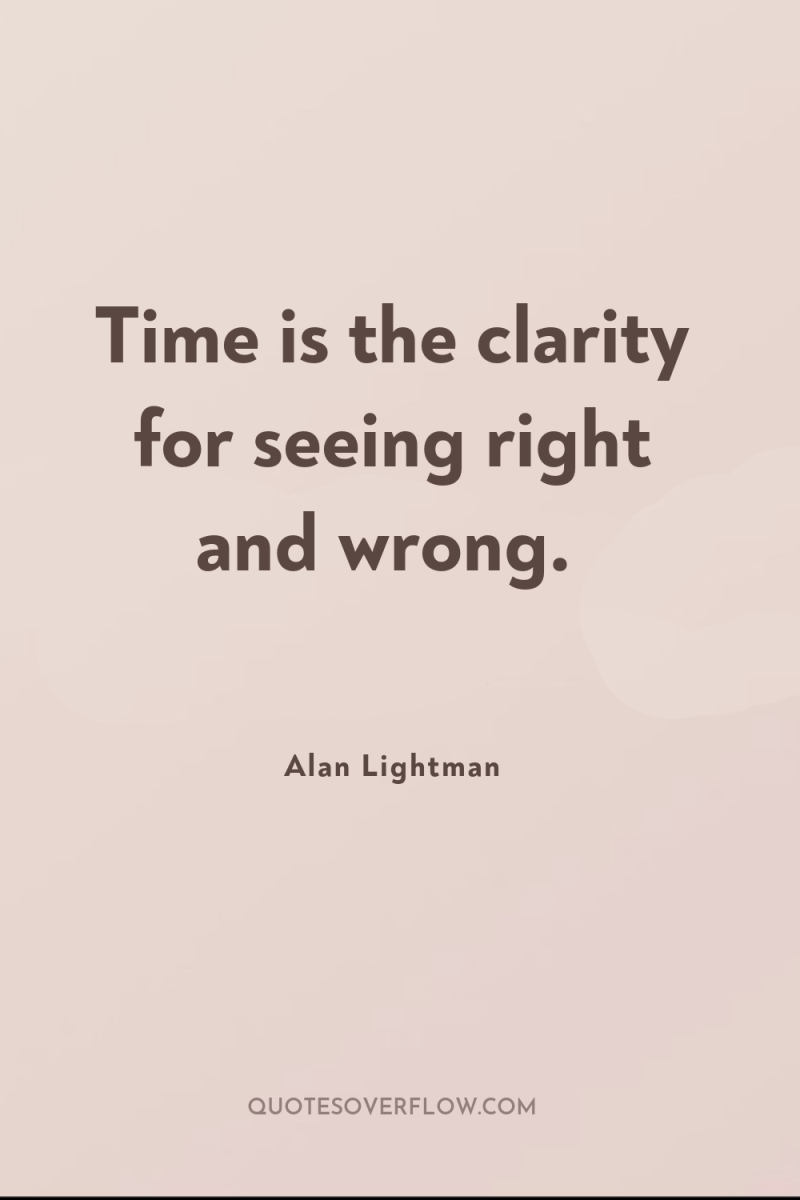
6
Time is the clarity for seeing right and wrong.Alan Lightman
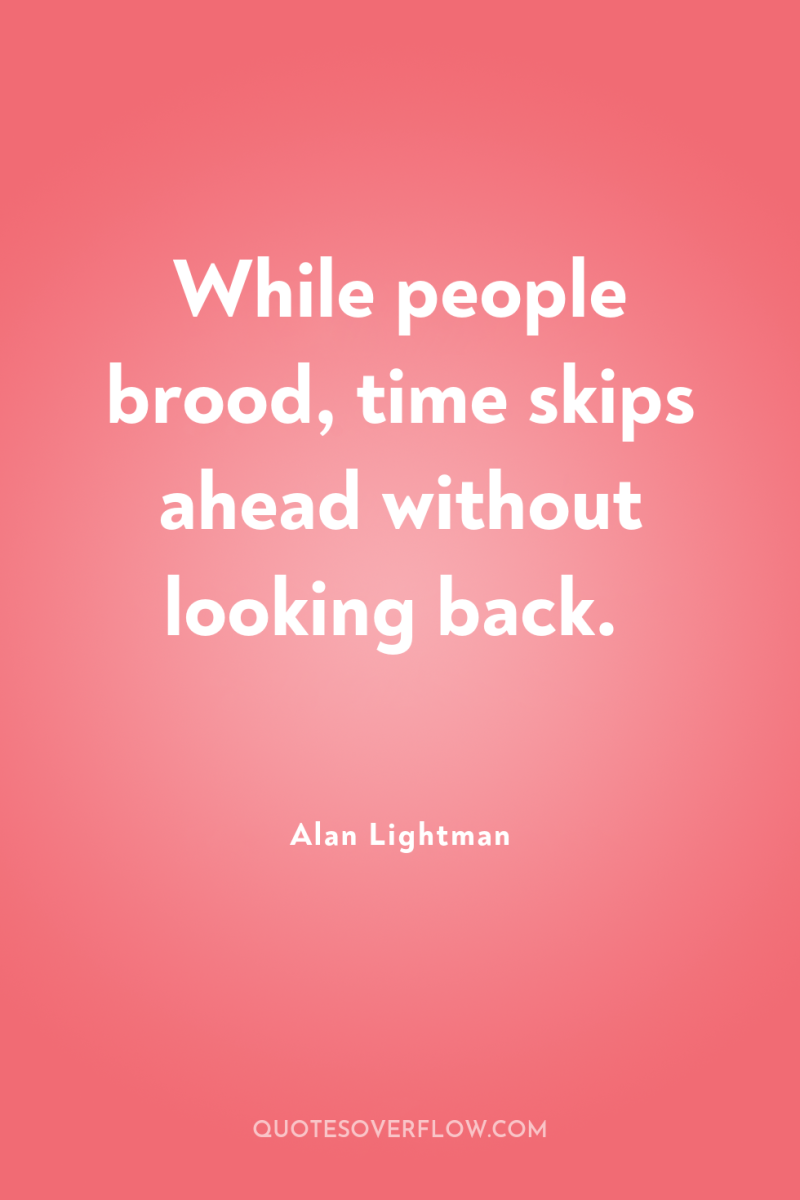
7
While people brood, time skips ahead without looking back.Alan Lightman
8
But what is the past? Could it be, the firmness of the past is just illusion? Could the past be a kaleidoscope, a pattern of images that shift with each disturbance of a sudden breeze, a laugh, a thought? And if the shift is everywhere, how would we know?Alan Lightman
9
Something else gets under your skin, keeps you working days and nights at the sacrifice of your sleeping and eating and attention to your family and friends, something beyond the love of puzzle solving. And that other force is the anticipation of understanding something about the world that no one has ever understood before you. Einstein wrote that when he first realized that gravity was equivalent to acceleration -- an idea that would underlie his new theory of gravity -- it was the "happiest thought of my life." On projects of far smaller weight, I have experienced that pleasure of discovering something new. It is an exquisite sensation, a feeling of power, a rush of the blood, a sense of living forever. To be the first vessel to hold this new thing. All of the scientists I've known have at least one more quality in common: they do what they do because they love it, and because they cannot imagine doing anything else. In a sense, this is the real reason a scientist does science. Because the scientist must. Such a compulsion is both blessing and burden. A blessing because the creative life, in any endeavor, is a gift filled with beauty and not given to everyone, a burden because the call is unrelenting and can drown out the rest of life. This mixed blessing and burden must be why the astrophysicist Chandrasekhar continued working until his mid-80's, why a visitor to Einstein's apartment in Bern found the young physicist rocking his infant with one hand while doing mathematical calculations with the other. This mixed blessing and burden must have been the "sweet hell" that Walt Whitman referred to when he realized at a young age that he was destined to be a poet. "Never more, " he wrote, "shall I escape. .Alan Lightman
10
What sense is there in continuing when one has seen the future?Alan Lightman
11
The catchers delight in the moment so frozen but soon discover that the nightingale expires, its clear flutelike song diminishes to silence, the trapped moment grows withered and without life.Alan Lightman
12
The tragedy of this world is that no one is happy, whether stuck in a time of pain or of joy. The tragedy of this world is that everyone is alone. For a life in the past cannot be shared with the present. Each person who gets stuck in time gets stuck alone.Alan Lightman
13
Continents of memory had been lost.Alan Lightman
14
Events, once happened, lose reality, alter with a glance, a storm, a night. In time, the past never happened. But who could know? Who could know that the past is not as solid as this instant…Alan Lightman
15
The tragedy of this world is that everyone is alone. For a life in the past cannot be shared with the present.Alan Lightman
16
And at the place where time stands still, one sees lovers kissing in the shadows of buildings, in a frozen embrace that will never let go. The loved one will never take his arms from where they are now, will never give back the bracelet of memories, will never journey afar from his lover, will never place himself in danger of self-sacrifice, will never fail to show his love, will never become jealous, will never fall in love with someone else, will never lose the passion of this instant of time.Alan Lightman
17
Human beings consider themselves satisfied only compared to some other condition. A man who has owned nothing but a bicycle all of his life feels suddenly wealthy the moment he buys an automobile.. But this happy sensation wears off. After a while the car becomes just another thing that he owns. Moreover, when his neighbor next door buys two cars, in an instant our man feels wretchedly poor and deprived.Alan Lightman
18
When a traveler from the future must talk, he does not talk but whimpers. He whispers tortured sounds. He is agonized. For if he makes the slightest alteration in anything, he may destroy the future. At the same time, he is forced to witness events without being part of them, without changing them. He envies the people who live in their own time, who can act at will, oblivious of the future, ignorant of the effects of their actions. But he cannot act. He is an inert gas, a ghost, a sheet without soul. He has lost his personhood. He is an exile of time. .Alan Lightman
19
Then there are those who think their bodies don't exist. They live by mechanical time. They rise at seven o'clock in the morning. They eat their lunch at noon and their supper at six. They arrive at their appointments on time, precisely by the clock. They make love between eight and ten at night. They work forty hours a week, read the Sunday paper on Sunday, play chess on Tuesday nights. When their stomach growls, they look at their watch to see if it is time to eat. When they begin to lose themselves in a concert, they look at the clock above the stage to see when it will be time to go home. They know that the body is not a thing of wild magic, but a collection of chemicals, tissues, and nerve impulses. Thoughts are no more than electrical surges in the brain. Sexual arousal is no more than a flow of chemicals to certain nerve endings. Sadness no more than a bit of acid transfixed in the cerebellum. In short, the body is a machine, subject to the same laws of electricity and mechanics as an electron or clock. As such, the body must be addressed in the language of physics. And if the body speaks, it is the speaking only of so many levers and forces. The body is a thing to be ordered, not obeyed.Alan Lightman
20
Unconditional love. That’s what he wants to give her and what he wants from her. People should give without wanting anything in return. All other giving is selfish. But he is being selfish a little, isn’t he, by wanting her to love him in return? He hopes that she loves him in return. Is it possible for a person to love without wanting love back? Is anything so pure? Or is love, by its nature, a reciprocity, like oceans and clouds, an evaporating of seawater and a replenishing of rain? .Alan Lightman
21
Some make light of decisions, arguing that all possible decisions will occur. In such a world, how could one be responsible for his actions? Others hold that each decision must be considered and committed to, that without commitment there is chaos. Such people are content to live in contradictory worlds, so long as they know the reason for each.Alan Lightman
22
I've taken a philosophical position on e-mail. Although I think it's a wonderful communication technology, and it has a lot of good uses, it is abused quite a lot.Alan Lightman
23
I think e-mail is representative of our fast food mentality in the United States, where everything has gotten faster and faster, and we're required to respond to inputs more quickly with less time for thought and reflection. I believe that we need to slow down.Alan Lightman
24
I have always loved magic realism as a form of writing. I have also been fascinated for a long time with the intersection of science and religion.Alan Lightman
25
As both a scientist and a humanist myself, I have struggled to understand different claims to knowledge, and I have eventually come to a formulation of the kind of religious belief that would, in my view, be compatible with science.Alan Lightman
26
Music is, of course, a universal emotional experience, cutting across cultures and languages. I studied piano for ten years as a child and consider that experience one of the most valuable in my life.Alan Lightman